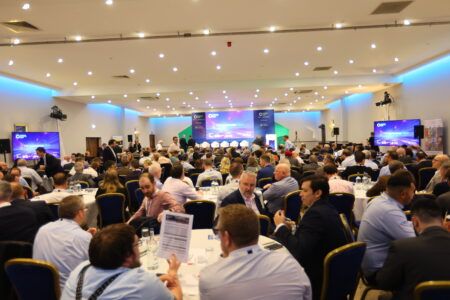Siemens will showcase technology to connect vehicles to the Internet of Things (IoT) and pave the way for autonomous driving, for the first time in the Middle East at the Gulf Traffic 2016 show, which will take place next week on November 13-15 in Dubai, UAE.
Siemens will also show systems for smart parking and tunnel control, as part of its focus on digital mobility solutions for smart cities. Siemens’s Sitraffic ESCoS (Eco System-Cooperative System), with Vehicle2X and Car2X communication technology, is a key component of a digital road system. The platform creates an intelligent transport network by connecting vehicles and infrastructure to the IoT, allowing them to exchange real-time data.
The technology enables cars to communicate and cooperate with each other and traffic infrastructure, automatically passing along messages regarding road conditions, traffic flow and obstacles, before they appear in the visual range of the driver. Vehicles are also able to receive signals from intelligent road signs, giving precise indicators for traffic situations, optimizing traffic flow, reducing tail-backs and accidents and minimizing emissions.
Sitraffic ESCoS technology is a key step on the path toward fully autonomous driving. This first stage of connecting cars and road infrastructure is already operational in projects in England, Austria, Germany and the Netherlands. Ultimately, it will connect and integrate all transport modes and infrastructure to the IoT, including aircraft, trains, trams, buses, ships, parking lots and cars.
At Gulf Traffic, Siemens will also be showcasing its Integrated Smart Parking Solution, a modular system that uses unique overhead radar, ground sensors, and cameras, to gather real-time data on current traffic conditions. This data can be used by authorities and operators for parking enforcement, and by road users for automatic navigation to available parking via a mobile app. This reduces time spent searching for parking, easing traffic, lowering emissions, and improving the overall travel experience in a city. It can also be paired with statistical data to create accurate traffic predictions, simplifying analysis and regulation of parking, improving potential revenues, and enabling simplified route planning for drivers.
The company’s International Tunnel Control Center (ITCC) will also be on show in Dubai. A modular system, ITCC is able to monitor traffic guidance and control equipment, light, air and power supplies, smoke and fire detection, pollution measurement, pumps, and emergency call systems. All the information from these subsystems is integrated into the Sitraffic ITCC, allowing a coordinated strategy, promoting safe traffic guidance, and a high level of safety.
“We are in an era which demands an increasingly intelligent approach to transport and traffic management; one in which digital technologies hold the key to optimizing the performance of modern, multi-modal transport networks,” explained Joerg Scheifler, senior executive vice president of the mobility division at Siemens Middle East.
“The UAE in particular is taking great strides toward developing smart infrastructure, with the wellbeing of the population a high priority. Using digitalization technology to build safe, efficient, future-proof and environmentally sympathetic transport networks is an important part of the transition toward fully smart cities.”




